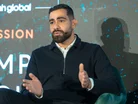Klarna: Q&A With CSO Salah Said

In the wizened and wily worlds of banking and finance, Klarna's BNPL solutions are growing ever more popular. Established in 2005, launched in the US in 2015 and a household name by 2024, the Swedish fintech company has been on a meteoric rise over the past two decades.
Initially standing out from the crowd by offering customers a "buy now, pay later" option for online transactions, Klarna has expanded greatly in recent years, offering a whole range of financial services including loans, physical payment cards and a money management platform.
As a predominantly virtual business, Klarna has a relatively small carbon footprint. This, however, does not stop its team from placing a huge value on its sustainability and ESG credentials. Prioritising sustainability has helped Klarna stand out once again, as the company picked up the Net Zero Award at this year's Global Sustainability & ESG Awards.
To encourage sustainable living throughout its operational chain, Klarna imposes an internal carbon tax, designed to incentivise reductions in carbon emissions. Klarna also encourages its users to shop sustainably, highlighting retail partners that offer circular services and resale options.
The man at the helm of the Swedish company's sustainability journey is Salah Said, who was in attendance at Sustainability LIVE 2024. After speaking on a panel discussing Climate Impact Strategies, Sustainability Magazine chatted with Salah about his work.
What inspired you to get involved in sustainability and ESG?
I've been in sustainability for a bit more than 12 years now. Before that, I was working a lot in nonprofits, social innovation, social businesses and entrepreneurship and I felt it was always so hard to get corporates to do more. I felt there was a need to change things from within. So, sustainability was a great opportunity for me to go and do a little bit of entrepreneurship and help companies do better.
Are there any trends or innovations you're excited about in sustainability?
I think a lot of companies have embraced collaborations with nonprofits and social businesses, seeing them as an opportunity to drive innovation within the business and not only as a vehicle to support more social and environmental impact outside of the business.
"Obviously sustainability isn't prioritised by every business in the world, otherwise we wouldn't be here."
So that collaboration, I think, is really, really exciting. I think what we're seeing today is a lot more companies embracing AI as a vehicle to drive change faster from enhancing reporting on ESG to really finding innovative ways to help consumers make more sustainable choices. That's something we're exploring at Klarna, and it's been really fascinating.
What are your biggest takeaways from Sustainability LIVE so far?
What I really love is that this is a space for sustainability managers to come together and exchange and learn from each other, and it's a really safe space to talk about challenges, not only about the great stuff that everybody's doing. So having that space and room to talk about common challenges and how to overcome them has been really fun.
Can events like this contribute to the broader sustainability movement?
I think events around sustainability are really needed on the one hand to meet your allies and make sure that you understand you're not alone on this journey. Obviously sustainability isn't prioritised by every business in the world, otherwise we wouldn't be here.
But I think it's a good opportunity for people to understand they are in this movement together with others and they're here to support each other. It's not just about being competitive and sustainability. It's a great place for companies to come together and learn from each other and drive positive together.
Do you think collaboration is important in sustainability?
Collaboration is key and I feel sustainability is a pretty competitive space for a lot of companies, especially in a time where sustainability and ESG become commodities. It's so much harder to actually have a competitive edge in sustainability and it's a good thing because this is where companies can come and work together and drive change more meaningfully.
How do you anticipate sustainability practices changing over the next five years?
I think for the majority of companies, the reality is that policies are increasing and expectations from stakeholders, especially investors are increasing. But at the same time, a lot of companies embrace the opportunity within sustainability. So when businesses like Klarna understand that there is a lot of business value within ESG and embrace it, there is a whole new opportunity around creating more value propositions to your customers.
**************
Make sure you check out the latest edition of FinTech Magazine and also sign up to our global conference series – FinTech LIVE 2024.
**************
FinTech Magazine is a BizClik brand.




